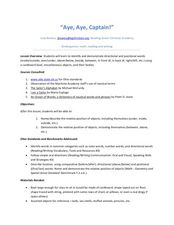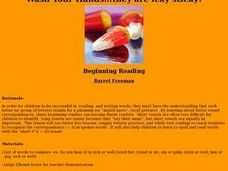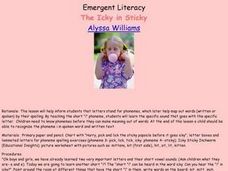Curated OER
Grandpa Ed
Students engage in an emergent literacy lesson that focuses on phonemic awareness. For practice they become more comfortable with a short vowel phoneme, which can often be the most difficult to identify, by learning it in isolation.
Curated OER
Aye, Aye Captain
Students investigate how correspondences appear differently in different words. They also recognize the difference between long and short vowels. Students study how these correspondences are spelled and pronounced differently.
Curated OER
EA Words
Students determine if the "e" sound is long or short in words. In this language arts lesson, students practice discriminating between the long and short "e" sounds by practicing with word cards that are embedded in the lesson. This...
Curated OER
Say What?
Students explore phonemes in spoken words. They discuss the /e/ (short e) correspondence. Students read "Red Gets Fed." They learn a meaningful letter symbol for the /e/. Students identify /e/ sound in both spoken and written words.
Curated OER
First Day of School
Primary learners complete pre reading, writing, during reading, and interdisciplinary activities for the book First Day of School. They will complete journal entries, answer short answer questions, have discussions, and much...
Curated OER
Red is My Pet!
Students complete a variety of activities related to the short /e/ sound. As a class they recite a tongue twister, and write the letter E. Students then listen to the book "Red Gets Fed," and identify the words in the story that...
Curated OER
What's Behind the Creaky Door?
First graders are introduced to the concept that letters stand for the mouth moves that we make when sounds are made. They practice making the /e/ sound and compare it to the sound a creaky door makes and then try saying the tongue...
Curated OER
"Ca...Ca...Ca...Caterpillar Blending"
Young scholars improve blending skills. They produce many individual short utterances and mouth moves (phonemes) into one long utterance (words) and create their own blending caterpillar. They draw a picture of a caterpillar with...
Curated OER
Letter Hunt
Students search for and find certain letters, blends, or vowel combinations in words, sentences and paragraphs. They investigate how these letters, blends or combinations are used in "every day" writing.
Curated OER
Rainbow Spelling: A Kinesthetic Approach to Encoding
Have your young learners interact with phonemes through this tactile plan! Each learner will have a colored mat where they connect different phonemes to create words. The best part is that they can self-correct easily as they spell!
Curated OER
Doo-Wop Pop
Doo-Wop Pop, by Roni Schotter is story that focuses on music and performing arts. Language arts activities include phonics, music, writing about dreams, poetry, and writing a letter are included in this literature guide. Furthermore...
Meadows Center for Preventing Educational Risk, University of Texas at Austin
Lesson 8 - Open Syllables
Just like scholars plug something in to close a circuit, they must plug a consonant onto a word to make closed syllables. Help learners distinguish between open and closed syllables with a series of activities that emphasize open...
Curated OER
Wash Your Hands...they are icky sticky!
Students engage in an emergent literacy instructional activity that focuses on phonemic awareness and they practice corresponding the letter "i" to its long or short sound. This type of recognition has been found to be essential to...
Curated OER
Open Wide at the Dentist, "Aaaahh"
Study the /o/ in both written and spoken words by reciting a tongue twister and making words using Elkonin letterboxes. Next, write a message about frogs using /o/ words. Finally, listen to a short book talk on "Doc in the Fog" before...
Curated OER
Eddie the Elephant
Learners need to practice sight words to become proficient readers. So it is very important for children to learn common correspondences. The phoneme for the letter "e" is practiced in this lesson plan.
Curated OER
The Icky in Sticky
Students study the /i/ sound by listening to it in words and a tongue twister which they later recite. Next, they practice writing the letter and making word using letterboxes. They listen to 'Icky Sticky Inchworm' while placing their...
Curated OER
Building a Sentence
First graders echo a sentence targeting a vowel selected by the teacher and shown on a sentence strip. In this sentence building instructional activity, 1st graders put the cut up sentence strip back into correct order, repeating the...
Curated OER
Beginning and Ending Sounds
First graders practice their letter and word recognition skills. In this initial and final sounds lesson plan, 1st graders participate in a classroom activity that requires them to blend phonemes into spoken words and sound out...
Curated OER
Hop Scotch
Students practice a variety of techniques and strategies to assess the letter sound of o=/o/. They encounter Elkonin Boxes to assist them with their task as well as the tongue twister "Oliver had an operation in October, and Oscar gave...
Curated OER
Segmenting and Blending Words
Students are introduced to the concept of segmentation and blending of words. As a class, they are shown various words and are asked to determine the amount of letters and sounds in each. To end the lesson, they participate in a...
Curated OER
Beginning Reading Design: Blending Boats
Students study how to blend the sounds together in words with the CVC form. They use letter cards and the books, "Tin Man Fix-It," and Dr. Seuss', Green Eggs and Ham. They work with /m/ words to blend the sounds together to read words....
Curated OER
Which Letter Comes First?
In this literacy worksheet, students find the pictures that correlate to the words and they also decide which letter to begin the spelling of each word.
Curated OER
Alphabet Organizer
Young scholars practice organizing their vocabulary words in an online organizer tool. In this vocabulary lesson, students read a text and take notes. Additionally, young scholars organize their vocabulary words into an online "Alphabet...
Curated OER
Growing Seeds
In this science worksheet, students read 5 different scenarios with varied growing conditions for plants. Students make a prediction for each: Will it grow a little, grow a lot, or not grow at all?

























